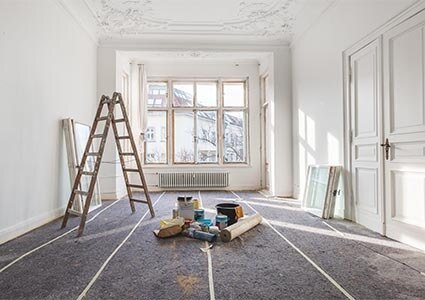
Sustainable Growth at AD Construction Group
Celebrated as an efficient and responsible construction partner, AD Construction Group Ltd (AD) is one of the leading privately-owned public-sector specialist providers of refurbishment services. Based in the London Borough of Bexley, the company’s geographical footprint covers the whole of London, the Southeast and the Home Counties. AD provides planned maintenance, refurbishment, fire risk assessments and decoration services for its clients via long-term frameworks, partnering agreements and some one-off contracts. Managing Director, Aaron Mitchell, uncovers the company’s 80-year-long history.
“Originally a subsidiary of Roberts Builders Ltd, AD broke away from the parent company in 1944 and established itself as an independent business. At the time,

the company was called Architectural Decorators, which it effectively still is. However, we now trade under the name AD Construction because our services extend beyond decorations. Today, we are based in Sidcup and most of our work is focused on social housing projects in London and the Home Counties. Our services encompass a wide range of tasks, including refurbishments, window installations, kitchen, and bathroom renovations, as well as cladding. Put simply, there are three main strands to the company. The first one is planned maintenance, which has been our bread and butter throughout our history. Additionally, we specialise in fire safety, including the implementation of updated fire safety measures which we have been doing well before the Grenfell incident. Lastly, we are also involved in healthy homes and retrofit projects, which encompass environmental upgrade works. As we are an SME, these areas are our primary focus,” he says.
Aaron follows-up by discussing how Grenfell impacted AD’s business avenues. “We initially completed a significant number of fire-related works after Grenfell, but we soon found that there was a race to the bottom in terms of rates and the quality of work being carried out. As a result, we decided to distance ourselves from that sector and have done a lot less fire-related work recently. This is mainly because some companies are offering prices that we do not believe allow for the work to be carried out properly and to the high standard we promise. Unlike those companies, we do not believe in using cheap materials and labour – we only use certain products and suppliers for specific projects. Consequently, we do not get involved in as many fire-related projects as we used to, even though they are in high demand,” he reveals.
Sustainable growth
Even though prospects within the fire safety sector currently seem limited, AD has shown great tenacity in the face of challenges in the past. “Sometimes, I think that our ability to navigate challenges like the pandemic is more a result of luck than deliberate planning. The pandemic was a very turbulent time for us, as we witnessed budget cuts across various areas, alongside job cuts and project cancellations. Still, on the flip side, we also unexpectedly received new work opportunities that we hadn’t anticipated. Obviously, we do manage and oversee our projects. We constantly review our progress and plans and typically so, every  fortnight at director level. In other words, we do have a good idea of our project pipeline, upcoming work, potential delays, and so on. So, we do take action to ensure a steady workflow, even during dystopian times like the pandemic. We’ve built our own path and neither want to grow too fast nor set overly ambitious goals. Our focus is on steady, sustainable growth, which is quite challenging considering that most of our work comes from repeat business, but we make great strides to ensure that we never execute any of our projects poorly. As the saying goes, ‘you’re only as good as your last job.’ Thus, if we want repeat business, it is vital for us to keep performing to the highest commercial standard for which we are renowned. This is how we deal with challenges, by consistently delivering a good standard product and exceptional level of service,” Aaron explains.
fortnight at director level. In other words, we do have a good idea of our project pipeline, upcoming work, potential delays, and so on. So, we do take action to ensure a steady workflow, even during dystopian times like the pandemic. We’ve built our own path and neither want to grow too fast nor set overly ambitious goals. Our focus is on steady, sustainable growth, which is quite challenging considering that most of our work comes from repeat business, but we make great strides to ensure that we never execute any of our projects poorly. As the saying goes, ‘you’re only as good as your last job.’ Thus, if we want repeat business, it is vital for us to keep performing to the highest commercial standard for which we are renowned. This is how we deal with challenges, by consistently delivering a good standard product and exceptional level of service,” Aaron explains.
Investment in people and processes
At the heart of AD’s current considerations is the company’s commitment to reducing its carbon footprint. “This is another challenge we are faced with at the moment, but we are taking the necessary steps towards it,” he continues. “We’ve expanded our head office and have completed extensive retrofit work to make it more sustainable. We fitted solar panels on the roof and insulated most of the building. Furthermore, we installed around 22 car chargers and are actively working towards expanding our fleet with more electric vehicles. The problem is that although our staff can charge their electric vehicles when they are in the office, it is not always convenient as most of them cannot charge their vehicles at home. This can be challenging if they are not coming to the office, as they need to make sure their vehicle is charged before going onsite or elsewhere. Despite this obstacle, we have encouraged most of our staff to own an electric vehicle,” highlights Aaron.
Keen to counter the skills shortage facing the construction industry, AD strives to train as many apprentices as possible. “Our training programme has been quite successful over the last couple of years, but more still needs to be done because we have got more people retiring than coming into the sector. To address this issue, we work closely with our clients who, for the most part, have their own schemes and initiatives to engage young people and residents in employment opportunities. One of the many initiatives we run involves collaborating with ex-military personnel, particularly those transitioning into civilian life, to provide them with work opportunities within construction and civil engineering,” Aaron concludes.
With 80 years of experience delivering top-notch refurbishment services, AD upholds its commitment to sustainable growth through investment in its people, fleet electrification, and collaboration with clients to address skills shortages in the industry.